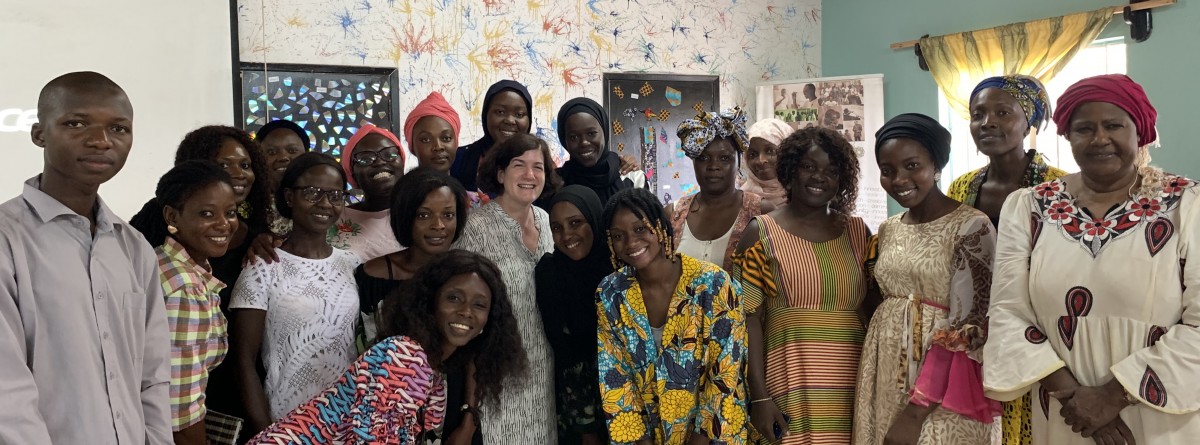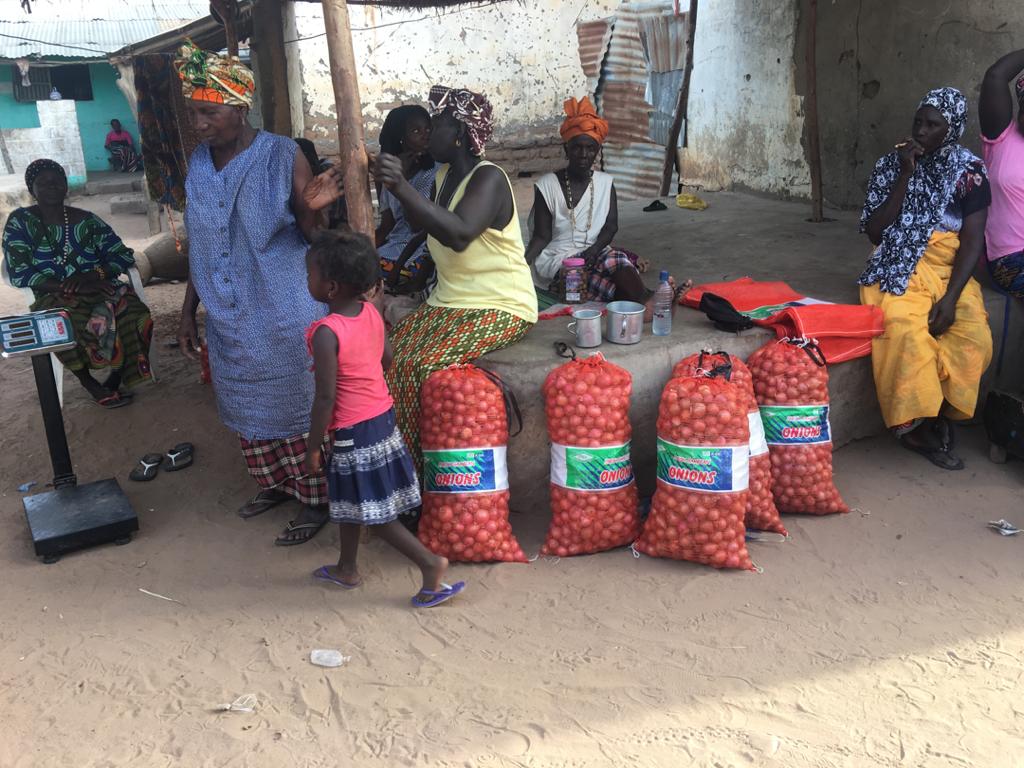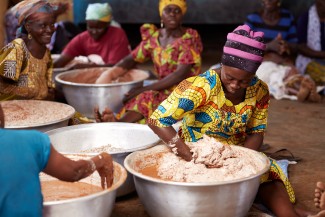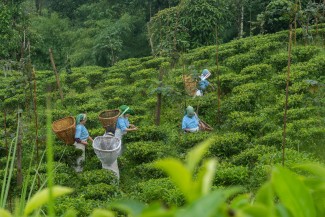Breaking ground with new ideas and new partnerships in two African countries
What do onions, leather handbags and moringa have in common?
Not much on their own, of course. But, they are what certain female-helmed businesses in Africa are selling, and therefore at the core of a developing movement supporting those enterprises.
[related-article]
That movement, started by the International Trade Centre as SheTrades in 2018, is joining people with differing expertise and creating new networks – ranging from a designer in Banjul to an international institution in Geneva to an investor in Dakar to government officials in Lusaka, with many stops in between.
“My husband and I were out in the diaspora for 16 years and decided to come back to Zambia. When I came back about two years ago and started farming, I realized that there wasn’t any organized group that was mobilising women in agriculture – so that’s how the idea of Nkoka Women in Agrobusiness was born,” said Nkolola Halwindi of the group she founded.
The Zambia-based community of female, small-scale farmers has a unique mandate and big aims, as does the larger SheTrades partnership to support women in trade of which they are a part.
Sharing spaces
Halwindi said of Nkoka, “Every emerging farmer that is a member is actually obliged to mentor somebody else. So we share information in terms of what grants are out there, what trainings are out there, who’s doing an agro-tour, who’s accessing networking functions.”
She attended a moringa-focused trade fair in India in late 2019 sponsored by SheTrades that she describes as “life-changing”.
“In Zambia, moringa is seen as something with health benefits but when we went to India it opened our minds and our eyes. We saw the commercial side of moringa,” she said. Following that trip, Nkoka is delving into the products that can be made by processing moringa and the profit potential.
It is just these sorts of idea-spurring interactions that SheTrades is aiming for, setting up brainstorming sessions, hosting business-focused trainings and sending people to trade fairs.
Fiona Coleman, a UK-based consultant, is working with women in the fashion business in Zambia and The Gambia, first accompanying a group of 13 trade show first timers from Zambia to Cape Town. Following that, she has been hosting trainings covering many of the necessary details of running a business, from designing a collection to developing a business plan.

Trade training in The Gambia (photo courtesy of Fiona Coleman)
“We chose 10 women who were at the right level to be considered for international trade for me to mentor on a one-to-one basis for six months. Because of COVID the coaching has had to be totally virtual, through Zoom meetings. Some want to set up websites or improve their social media and some want to create new collections – so it’s very targeted,” Coleman said.
Coleman noted that one focus is helping this group of idea-driven entrepreneurs look for gaps in the market and differentiate their products.
“In The Gambia particularly companies are used to doing direct-to-consumer bespoke level items, many are not used to creating collections and planning ahead, instead they are used to a customer asking for something and then making to order. So we are focusing on how to range plan and put a collection together, thinking what items to design, what kind of fabrics, patterns, what do you need to buy from wholesalers,” she said.
Enter prize
Getting young businesses into shape also involves sales and marketing, which is a part of the support being offered.
Abdoulie Jammeh, Deputy Permanent Secretary at the Ministry of Trade in The Gambia said, “We observed that the Ministry of Agriculture in collaboration with different development partners have invested a lot in terms of improving the infrastructure of community agriculture, but we saw that the women expressed clearly the challenges they face in terms of marketing their products.”
They are starting off addressing that gap with onions, with about 90% of the country’s production done by women, he noted.

Onion production in The Gambia is mostly done by women (photo courtesy of Abdoulie Jammeh)
“The women were having difficulty selling, even while Gambian companies were importing onions. We linked these importers with associations in different regions, and those importers have the network of retailers to sell to around the country,” Jammeh said.
“This used to be a challenge for women, now that we have secured that there are people to buy, they no longer have to work on credit and that is a big relief for the onion producers and we believe that this is also going to push onion production in this country,” he said.
Another tactic to spur small female-headed business success lies on the investing side, with a new angel investors network in The Gambia making their first investment in Daraja, a local handbag enterprise.
“When you invest you have to follow a specific way of doing it – there are structures to follow and it’s not just about giving money, it’s about giving money and being there to provide some support and the skills you have learned during your own entrepreneurship and also maybe some contacts you have. That’s where you can expect some success,” said Adrame Ndione, head of the Gambia Angel Investors Network (GAIN).
With Daraja owner Adiatou Conteh, they worked on her business plan, her legal structure, her branding and her financials.
Conteh said, “I had to go through the process of really looking through my business properly and looking at how I’ve been doing. As a creative sometimes you can focus more on the creative side of the business so it’s been really helpful for me to look through my accounts and I said ‘Oh wow actually I’ve done much better than I thought I’d done.’”

Daraja focuses on handmade leather items (courtesy of Adiatou Conteh)
“It’s given me the sense to know I’ve been able to do this, I’ve been able to achieve this in these past few years and now this is what I want to achieve moving forward.”
Revolution
These new connections and the new knowledge being generated are spurring thoughts of the future.
Halwindi said, “We have a project we are calling Project 2029, we are targeting to get at least 50 women farmers to become commercial farmers by the year 2029. We started this journey in 2019 so we’ve given ourselves 10 years. We are looking at women that will have a net profit of US$1 million annually. Where I am sitting here in Zambia as a small-scale woman farmer that sounds like a mammoth task, but we are committed, we are mobilising sponsors and identifying women who have that capacity to get where we want to get.”
And the relationships resulting from these sorts of links are manifesting in various ways.
“It’s about introducing people to each other. A lot of women with small businesses can feel isolated, bringing them all together for training or events helps keep momentum up and getting them to talk to each other is always good,” Coleman said.
She spoke of one woman who had gone to a trade show in China, and after she returned was asked about one of the highlights of her trip. The response? Meeting other SheTrades members.
---------------------
SheTrades projects in Zambia and The Gambia are supported by EIF's Empower Women, Power Trade initiative, which aims at transforming the economic lives of women in least developed countries (LDCs). Aiming to impact 50,000 women by 2022, Empower Women, Power Trade is also supporting projects in Haiti, Ethiopia and Burundi in partnership with EQUALs.
©EIF
If you would like to reuse any material published here, please let us know by sending an email to EIF Communications: eifcommunications@wto.org.


